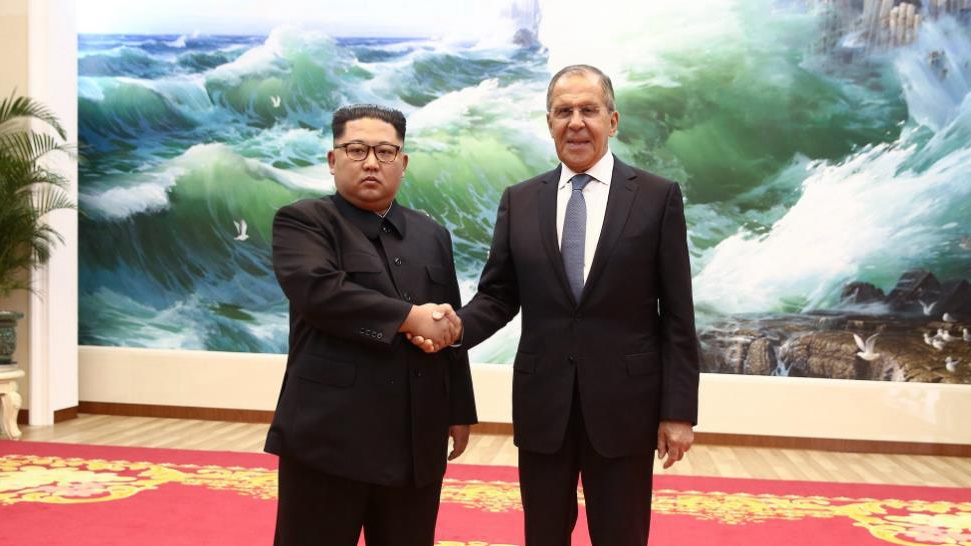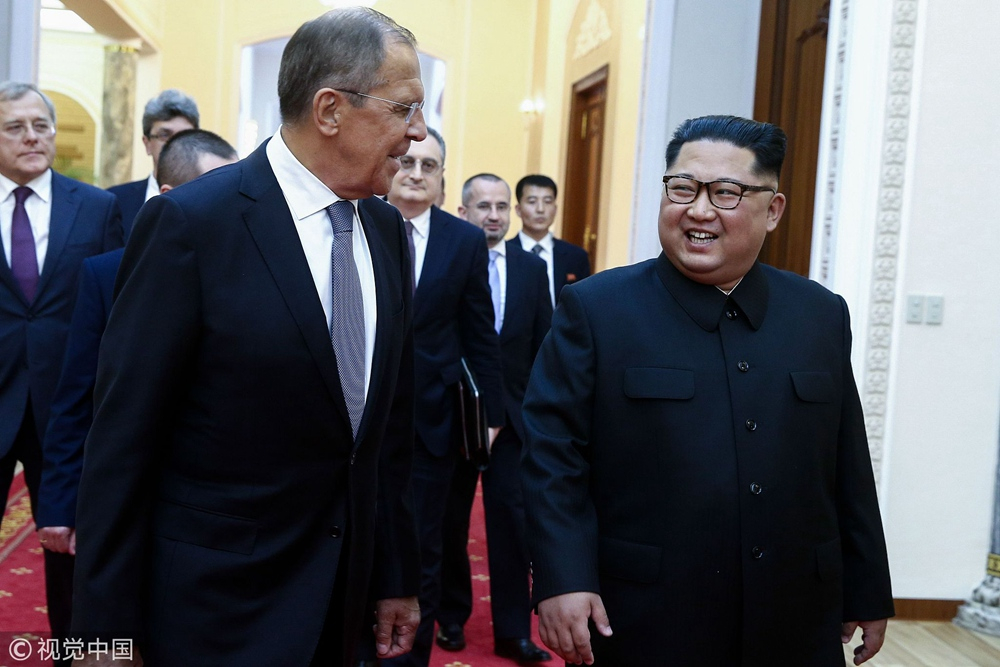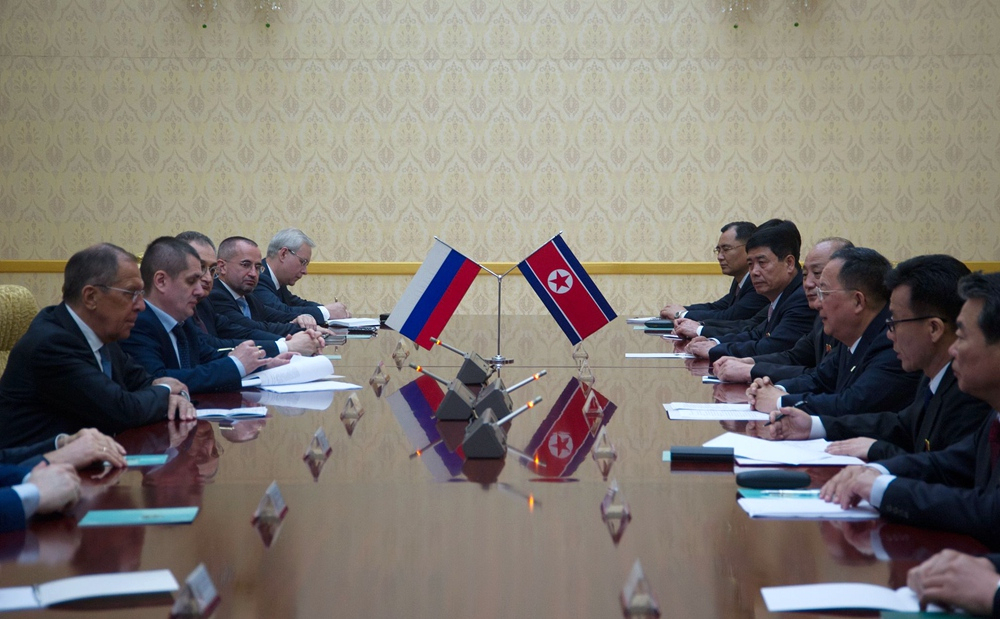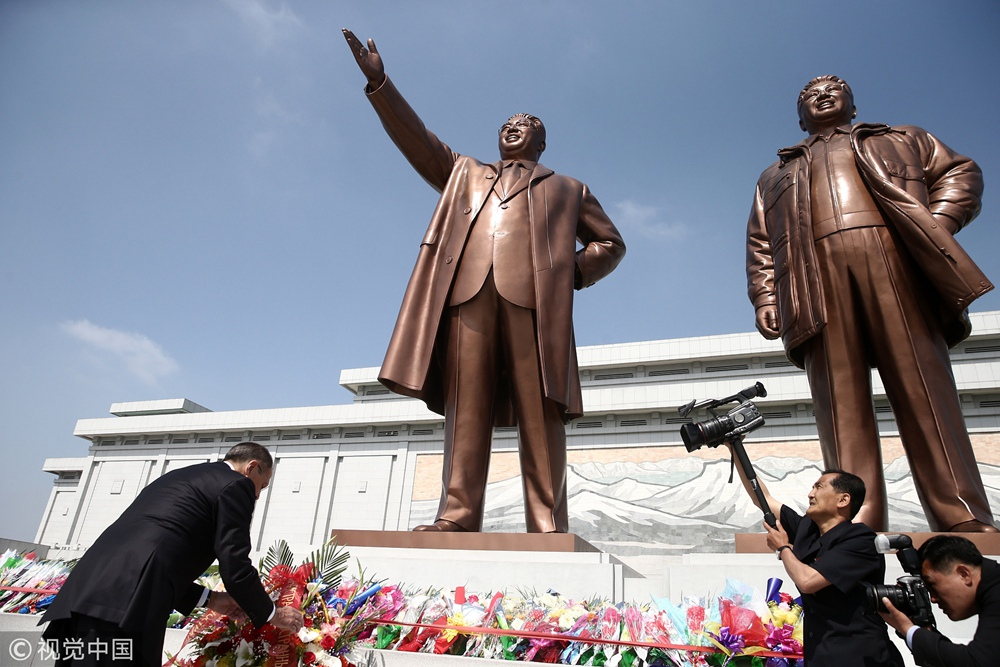
Politics
11:44, 31-May-2018
Lavrov in Pyongyang: Russia welcomes possible Trump-Kim summit
CGTN
00:34

Russian Foreign Minister Sergey Lavrov said on Thursday that Moscow welcomes a possible meeting between US President Donald Trump and leader of the Democratic People's Republic of Korea (DPRK) Kim Jong Un on June 12.
He made the remarks during his meeting with DPRK Foreign Minister Ri Yong Ho in Pyongyang. "We welcome the summits between Pyongyang and Seoul which have already taken place and the planned meetings at the highest level between the leadership of the Democratic People's Republic of Korea and the US," he said, according to Russia's TASS news agency.
Lavrov also met with Kim and invited the DPRK leader to visit Russia. "Come to Russia. We would be very happy to see you," Lavrov, seated across a table from Kim, said during a televised meeting.

DPRK leader Kim Jong Un (R) meets with Russian Foreign Minister Sergei Lavrov (L) in Pyongyang, May 31, 2018. /VCG Photo
DPRK leader Kim Jong Un (R) meets with Russian Foreign Minister Sergei Lavrov (L) in Pyongyang, May 31, 2018. /VCG Photo
Russia's top diplomat expressed Moscow's support for a declaration last month in which the DPRK and the ROK agreed to work for the denuclearization of the Korean Peninsula. He said Moscow hoped all sides would take a measured approach to possible forthcoming talks on a nuclear settlement.
"This will allow for the realization not only of the denuclearization of the whole Korean Peninsula but also to provide sustainable peace and stability across Northeast Asia," Lavrov was quoted as saying by his ministry.
Lavrov's visit comes amid a flurry of diplomatic activities to organize the Trump-Kim summit, with US Secretary of State Mike Pompeo also meeting Kim's envoy Kim Yong Chol in New York late Wednesday. It is Lavrov's first visit to the DPRK since 2009.

DPRK Foreign Minister Ri Yong Ho (3rd R) talks with Russia's Foreign Minister Sergei Lavrov (L) at the Mansudae Assembly Hall in Pyongyang, May 31, 2018. /VCG Photo
DPRK Foreign Minister Ri Yong Ho (3rd R) talks with Russia's Foreign Minister Sergei Lavrov (L) at the Mansudae Assembly Hall in Pyongyang, May 31, 2018. /VCG Photo
Kim: DPRK's denuclearization will 'unchanged'
During the meeting, Kim said the DPRK's will for denuclearization of the Korean Peninsula is "unchanged, consistent and fixed," Korean Central News Agency (KCNA) reported on Friday.
Kim also said he hoped that the DPRK-US relations and the issue of denuclearizing the Korean Peninsula will be solved on a stage-by-stage basis by finding a solution to meet the interests of each other through a new method in a new era and under a new situation.
"The solution of the issues will progress through effective and constructive dialogue and negotiation," he was quoted as saying.
Lavrov also conveyed a personal letter from Russian President Vladimir Putin during the meeting, said KCNA.
Russia's role in DPRK issue
While the US vows to maintain "maximum pressure" against the DPRK until its "complete denuclearization", China and Russia have been calling for a stage-by-stage approach with concerted efforts from all parties.
Chinese State Councilor and Foreign Minister Wang Yi told Lavrov in April that relevant parties should promote the peace process step by step and meet each other half way with the precondition of denuclearization.

Russian Foreign Minister Sergei Lavrov lays flowers at the monuments to former DPRK leaders Kim Il Sung and Kim Jong Il in Pyongyang, May 31, 2018. /VCG Photo
Russian Foreign Minister Sergei Lavrov lays flowers at the monuments to former DPRK leaders Kim Il Sung and Kim Jong Il in Pyongyang, May 31, 2018. /VCG Photo
Lavrov's meeting with the DPRK leader was part of Moscow's efforts to push Washington to ease sanctions and make other concessions, said Anthony Rinna, a specialist in Korea-Russia relations at the Sino-NK website, Reuters reported.
Russia does not want to be absent from the diplomacy in the lead-up to the June 12 summit, he said, adding that Moscow is also keen to "foster economic cooperation with both North and South Korea" in the longer term.
809km

SITEMAP
Copyright © 2018 CGTN. Beijing ICP prepared NO.16065310-3
Copyright © 2018 CGTN. Beijing ICP prepared NO.16065310-3